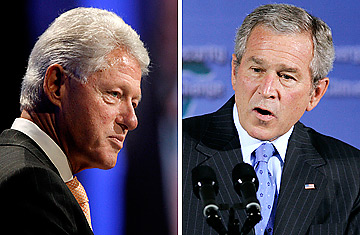
Former President Bill Clinton and President George W. Bush
Climate change geeks with a thing for international conferences — like me — were spoilt for choice this past week. You could rub shoulders with national leaders from over 80 countries — or just their junior advisers, depending on the color of your badge — at the United Nations high-level meeting on climate. You could Amtrak down to the White House and hear President George W. Bush tell the world's major economies that this global warming thing might actually be a problem and that we should maybe consider doing something about it eventually. Or you could catch the Clinton Global Initiative's annual meeting in Manhattan, where billionaire executives, extremely smart people and star-struck journalists listened raptly as Brad Pitt detailed his plans to rebuild New Orleans in fabulously green fashion.
Of the three, it was the Clinton meeting that proved the best bet — and not just because of the Tastes of the World cocktail reception at the Sheraton on Thursday evening. As part of his Clinton Climate Initiative, launched in August 2006, the former President has brought together business and philanthropy to generate locally focused efforts to reduce energy use and carbon emissions. While President Bush offered mostly empty rhetoric, on Friday afternoon Clinton reeled off pledge after concrete pledge for his climate initiative: $150 million to harness geothermal energy in Africa, $5 million for the Alliance for Climate Protection in the U.S., $210 million for carbon offsetting in the developing world. While UN action on climate change remains stalled by the deadlock between the developed and the developing world, Clinton has proved remarkably successful in fostering real engagement and investment on global warming across national lines. "Clinton just really gets it," says Ted Nordhaus, co-author of the new environmental politics book Break Through.
The success of the Clinton Initiative is emblematic of how people who care about climate change in America have chosen to approach the problem in the near total absence of action from Washington. Lobbying has shifted to the corporate world, where large companies like Wal-Mart have implemented energy efficiency polices far more aggressive than anything coming from the government. High-profile celebrities like Pitt and Leonardo DiCaprio have made green cool for consumers. And hardly a day goes by without news of a leap forward on solar, wind or hybrid cars, thanks to private investment — again, in the absence of significant government spending.
But there's a risk that the Clinton Initiative and similar efforts could give way to a kind of private-sector triumphalism, a belief that it doesn't matter if Washington remains irrelevant on climate change. Nothing could be further from the truth. Bill Clinton and Wal-Mart can't fix global warming on their own, and as impressive as recent corporate initiatives on energy have been, they don't add up to the transformative changes needed to fully wean the world — not just the U.S. — off fossil fuels. "We need private sector leadership, and it's great that Clinton is bringing this together," says Carl Pope, executive director of the Sierra Club. "But government writes the rules of the game and government reigns."
So what is Washington doing? While it's heartening that President Bush now does seem to believe that global warming is real, this week's meeting of the world's major carbon emitters offered no evidence that he is willing to meet the climate challenge. The President continued to reject Kyoto-style mandatory caps on carbon emissions and instead endorsed an "international clean technology fund" to finance alternative energy projects in developing nations. Nice idea, but meaningless without real spending to back it up. "Bush says we need technology, but spends no money," says Nordhaus. "Bush says we need to reduce emissions, but only voluntarily. Both positions are utterly cynical."
That much was clear to many of the European attendees in Washington, who viewed the summit at best as harmless, and at worst as an attempt to undermine the upcoming UN climate negotiations in Bali at the end of the year. But the good news is that if Bush is unlikely to move on global warming between now and the end of the term, there is another branch of the government that just might. Currently there are several pieces of climate change legislation floating around Congress, and with the Democrats in power, there's a chance that one might pass. "You're actually starting to see Congress talk seriously about commitment to climate change," says Annie Petsonk, international counsel at Environmental Defense. "Foreign countries are starting to recognize that." So it turns out that the hot place to be this week wasn't the UN, or the White House or even Clinton's party in Manhattan. It was Capitol Hill.
